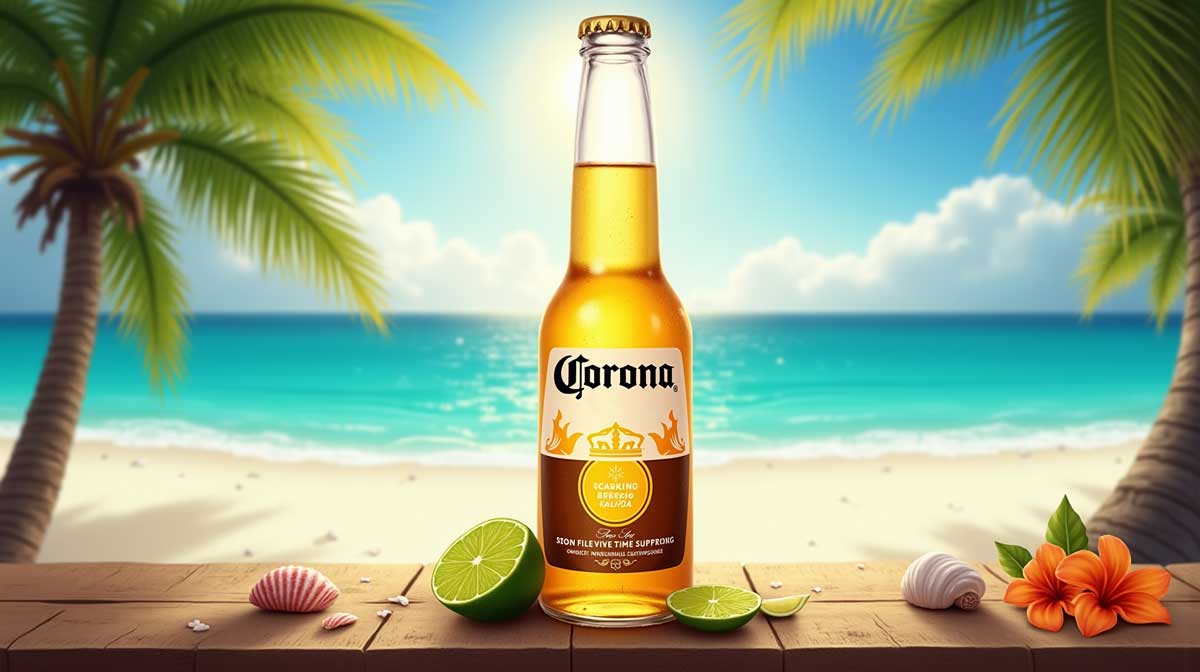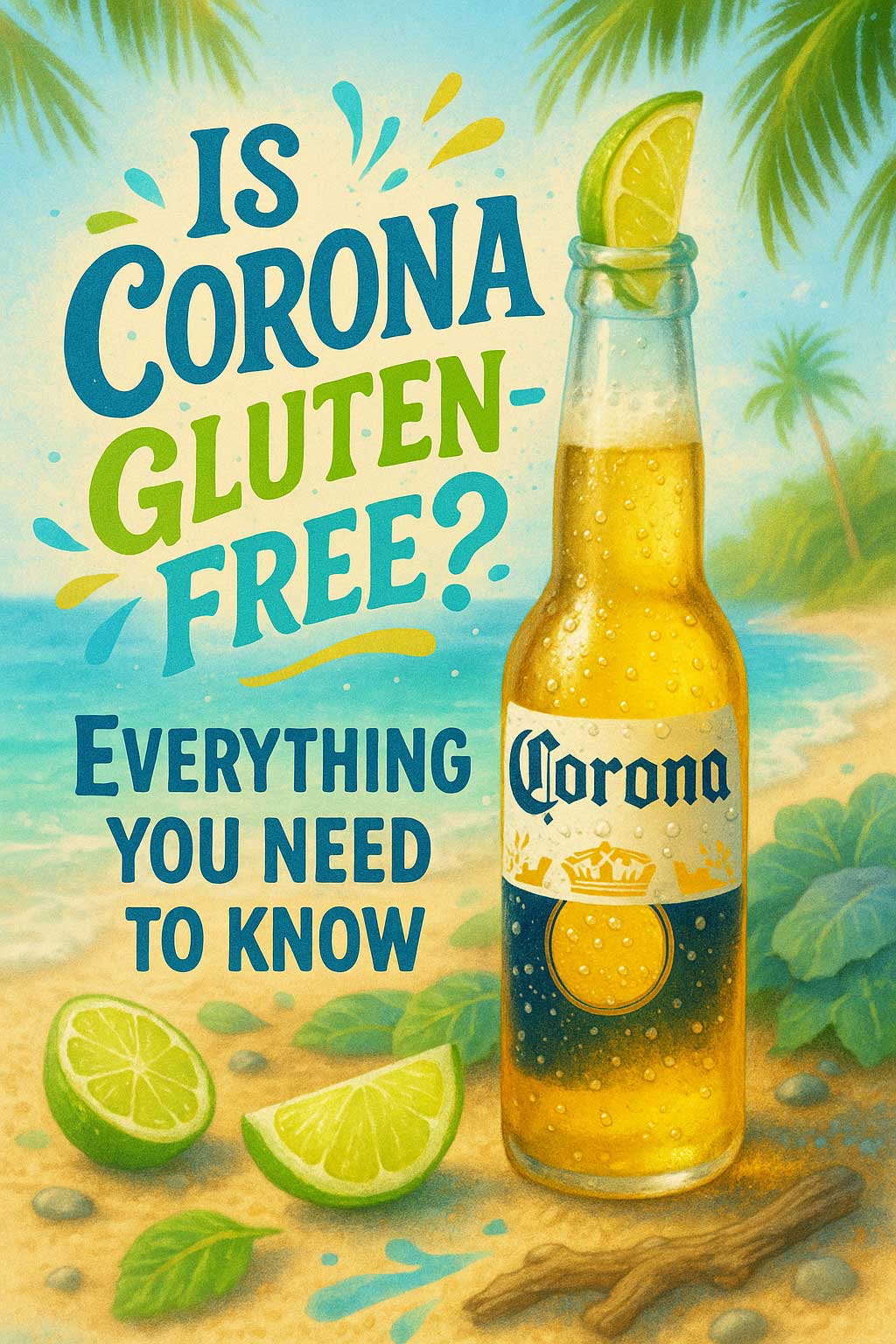What is gluten and why does it matter?
Gluten is a group of proteins found in grains like wheat, barley, and rye. For the estimated 1-2% of the population with celiac disease and up to 6% with non-celiac gluten sensitivity, consuming gluten can trigger serious health issues. When it comes to beer, many people wonder about the gluten content of popular brands like Corona.
Corona Beer contains barley malt, which is a source of gluten. Therefore, it is not classified as fully gluten-free. For those with gluten sensitivities or celiac disease, consuming products with gluten can lead to adverse reactions. Being aware of the gluten content in beverages like Corona Beer is essential to avoid potential health issues.

Corona products and their gluten status
While Corona Extra and Corona Light are made from barley malt, which contains gluten, the brewing process significantly reduces the gluten content to below the FDA’s standard for gluten-free products (20 parts per million). This means that some individuals with mild gluten sensitivities might be able to consume these variants without adverse effects. However, for those with celiac disease, it is always safer to opt for beers that are certified gluten-free.
| Corona Product | Contains Gluten? | Gluten PPM (approx) | Safe for Celiac? | Safe for Mild Sensitivity? |
|---|---|---|---|---|
| Corona Extra | Yes (reduced) | <20 PPM | Not recommended | Possibly |
| Corona Light | Yes (reduced) | <20 PPM | Not recommended | Possibly |
| Corona Premier | Yes | Varies | No | No |
| Corona Familiar | Yes | Varies | No | No |
| Corona Refresca | No | 0 PPM | Yes | Yes |
| Corona Hard Seltzer | No | 0 PPM | Yes | Yes |
It’s important to understand that “gluten-reduced” is different from “gluten-free.” Corona Extra and Light undergo a process that breaks down gluten proteins, but they are not made from naturally gluten-free ingredients like rice or sorghum.
How beer is brewed and where gluten enters the process
Beer brewing typically involves four main ingredients: water, malted grains (usually barley), hops, and yeast. The gluten content in beer comes primarily from the barley or wheat used in the brewing process.
- Malting: Barley grains are soaked in water, allowed to germinate, and then dried. This process activates enzymes that convert starches to fermentable sugars.
- Mashing: The malted barley is crushed and mixed with hot water to extract the sugars.
- Boiling: The liquid (wort) is boiled with hops for flavor and preservation.
- Fermentation: Yeast is added to convert sugars into alcohol and carbon dioxide.
Corona’s brewing process includes an additional step where enzymes are used to break down gluten proteins. This process, called enzymatic hydrolysis, reduces the gluten content but doesn’t eliminate it entirely.
Gluten testing in beer
Testing for gluten in beer is complicated because the fermentation process fragments gluten proteins. The standard ELISA test may not accurately detect these fragments. More accurate testing methods like R5 Competitive ELISA or mass spectrometry are used to measure gluten in fermented beverages.
Understanding gluten sensitivity and celiac disease
The spectrum of gluten reactions
Gluten reactions exist on a spectrum:
- Celiac Disease: An autoimmune disorder where gluten triggers an immune response that damages the small intestine. Affects about 1% of the population.
- Non-Celiac Gluten Sensitivity (NCGS): Symptoms similar to celiac disease but without intestinal damage. Affects an estimated 0.5-6% of people.
- Wheat Allergy: An allergic reaction to proteins in wheat, which may include gluten.
- No Sensitivity: Most people can consume gluten without issues.
Dr. Alessio Fasano, Director of the Center for Celiac Research at Massachusetts General Hospital, notes: “For individuals with celiac disease, even trace amounts of gluten can trigger an immune response. The safest approach is to consume only certified gluten-free products.”
Symptoms of gluten sensitivity
Recognizing the symptoms of gluten sensitivity is crucial for managing your health. Common symptoms include:
- Digestive issues: bloating, diarrhea, constipation, abdominal pain
- Neurological symptoms: headaches, brain fog, fatigue
- Skin problems: rash, eczema
- Joint pain
- Mood changes: anxiety, depression
Understanding how your body reacts to gluten can help determine if you have a sensitivity.
Diagnosis and testing
If you suspect gluten sensitivity:
- Don’t self-diagnose: Consult a healthcare provider before eliminating gluten.
- Testing options:
- Blood tests for celiac disease antibodies
- Genetic testing for celiac disease predisposition
- Intestinal biopsy (gold standard for celiac diagnosis)
- Elimination diet (under medical supervision)
Regulatory standards for “gluten-free” labeling
Different regions have varying standards for what qualifies as “gluten-free”:
- United States (FDA): Products must contain less than 20 parts per million (ppm) of gluten.
- European Union: Also uses the 20 ppm threshold.
- Australia/New Zealand: Stricter standard of no detectable gluten (essentially zero).
- Canada: Less than 20 ppm of gluten.
Corona Extra and Light fall below the 20 ppm threshold in testing but are not labeled as gluten-free because they’re made with barley, a gluten-containing grain.
Gluten-free alternatives to Corona
For those following a gluten-free diet, finding suitable beer options can be challenging. Fortunately, there are several gluten-free beers available that cater to different tastes.
Certified gluten-free beer options
| Brand | Taste Profile | Base Ingredients | Availability | Average Price |
|---|---|---|---|---|
| Omission | Light, Crisp, Smooth | Barley (gluten-removed) | Widely Available | $9.99/6-pack |
| Glutenberg | Fruity, Bold, Complex | Millet, Buckwheat, Corn | Specialty Stores | $12.99/4-pack |
| Ground Breaker | Rich, Hoppy, Balanced | Chestnuts, Lentils | Limited Availability | $15.99/6-pack |
| Holidaily | Malty, Balanced | Millet, Buckwheat | Regional | $11.99/6-pack |
| Ghostfish | Crisp, Aromatic | Rice, Millet | Specialty Stores | $10.99/4-pack |
| Redbridge | Smooth, Caramel Notes | Sorghum | Widely Available | $8.99/6-pack |
Naturally gluten-free alternatives to beer
If you’re looking beyond beer, consider these gluten-free options:
- Hard Ciders: Angry Orchard, Strongbow, Woodchuck
- Hard Seltzers: White Claw, Truly, Corona Hard Seltzer
- Wine: Most wines are naturally gluten-free
- Spirits: Distilled spirits like vodka, rum, tequila (made from 100% agave), and gin are generally gluten-free even if made from gluten-containing grains, as the distillation process removes gluten proteins
How to order at a bar when you’re gluten-sensitive
- Ask about dedicated taps: Cross-contamination can occur in tap lines.
- Request bottled options: Safer than draft options.
- Check with the bartender: Ask about gluten-free options specifically.
- Stick to ciders and seltzers: When in doubt, these are usually safer choices.
- Consider bringing a gluten testing device: Portable gluten testers are available for high-sensitivity individuals.
Hidden sources of gluten to watch for
Hidden sources of gluten can be found in sauces, seasonings, and processed foods. Carefully reading labels and choosing gluten-free alternatives can help avoid unintentional gluten consumption. Additionally, cross-contamination in shared kitchen spaces or restaurants can pose a risk for individuals with gluten sensitivity.
Common hidden sources include:
- Malt flavoring and extract
- Modified food starch (in some countries)
- Soy sauce (traditional varieties)
- Beer-based marinades and sauces
- Some artificial colors and flavors
Managing a gluten-free lifestyle
Consulting with a healthcare professional or registered dietitian can provide valuable guidance for managing gluten sensitivity. They can help develop a meal plan that meets your nutritional needs while avoiding gluten-containing foods and offer advice on navigating social situations or dining out.
Nutritional considerations
A gluten-free diet can sometimes lack certain nutrients commonly found in whole grains, including:
- B vitamins
- Fiber
- Iron
- Zinc
- Magnesium
Working with a dietitian can help ensure you’re getting these nutrients from other sources.
Comparing gluten content across popular beers
| Beer Brand | Gluten Content | Made From | Safe for Celiac? |
|---|---|---|---|
| Corona Extra | <20 ppm (reduced) | Barley | Not recommended |
| Budweiser | >20 ppm | Barley, Rice | No |
| Coors Light | >20 ppm | Barley, Corn | No |
| Heineken | >20 ppm | Barley | No |
| Omission | <10 ppm (reduced) | Barley | Not recommended |
| Glutenberg | 0 ppm | Millet, Buckwheat | Yes |
| Redbridge | 0 ppm | Sorghum | Yes |
| Bud Light | >20 ppm | Barley, Rice | No |
| Stella Artois | >20 ppm | Barley | No |
| Guinness | >20 ppm | Barley | No |
Should you drink Corona if you have gluten issues?
The decision to consume Corona depends on your specific condition and sensitivity level:
- Celiac Disease: Not recommended. Even reduced-gluten products may cause damage to the intestinal lining.
- Non-Celiac Gluten Sensitivity: Individual tolerance varies. Some may tolerate Corona Extra or Light, while others may react.
- Mild Gluten Sensitivity: Corona Extra or Light might be tolerable, but monitor your symptoms.
- No Gluten Issues: No restrictions necessary.
Dr. Peter Green, Director of the Celiac Disease Center at Columbia University, advises: “Individuals with celiac disease should avoid all beer made from gluten-containing grains, including those marketed as ‘gluten-removed,’ as there’s insufficient evidence that these products are safe for celiac patients.”
Conclusion
While Corona Extra and Corona Light have reduced gluten levels that fall below the FDA’s 20 ppm threshold, they are made from barley and are not certified gluten-free. Individuals with celiac disease should avoid these products and opt for truly gluten-free alternatives. Those with milder gluten sensitivity may tolerate Corona’s reduced-gluten products, but should monitor their symptoms carefully.
For a completely gluten-free option from the Corona brand, choose Corona Hard Seltzer or Corona Refresca, which contain no gluten ingredients. Always consult with a healthcare provider about your specific dietary needs and restrictions.

FAQs
Is Corona ok for gluten intolerance?
Corona Beer is not suitable for those with severe gluten intolerance due to its barley malt content. However, Corona Extra and Corona Light have reduced gluten levels (below 20 ppm) and may be tolerable for some with mild sensitivity.
What beer is best for gluten sensitivity?
Beers made from naturally gluten-free ingredients like sorghum, rice, or millet are safest. Brands such as Glutenberg, Ground Breaker, and Redbridge offer certified gluten-free options suitable for individuals with gluten sensitivity.
How much gluten is in beer?
The gluten content in traditional beer ranges from 1,000 to 2,000 ppm. Corona Extra and Corona Light have less than 20 parts per million, meeting FDA standards for gluten-free products, though they’re not certified gluten-free.
Does Coors Light have gluten?
Yes, Coors Light contains gluten from barley and is not suitable for those with gluten sensitivities or celiac disease.
Is Corona Seltzer gluten-free?
Yes, Corona Seltzer is gluten-free and safe for individuals with gluten sensitivities or celiac disease.
Can celiacs drink gluten-free beer?
Yes, individuals with celiac disease can safely consume beers that are certified gluten-free and made from naturally gluten-free ingredients like sorghum, rice, or millet.
Is Corona Light made with wheat?
No, Corona Light is made with barley malt, not wheat, though both contain gluten.
What alcoholic drinks are gluten-free?
Gluten-free alcoholic drinks include wine, distilled spirits (vodka, gin, tequila), hard ciders, and certified gluten-free beers made from alternative grains.
Is Corona a healthy beer?
While Corona is popular for its light and crisp taste, its healthiness depends on individual dietary needs and consumption levels. It contains fewer calories than many beers but is not gluten-free, except for Corona Hard Seltzer.
Can celiac people drink Corona?
Individuals with celiac disease should avoid regular Corona products that contain barley. Corona Hard Seltzer and Corona Refresca are gluten-free options that are safe for those with celiac disease.


